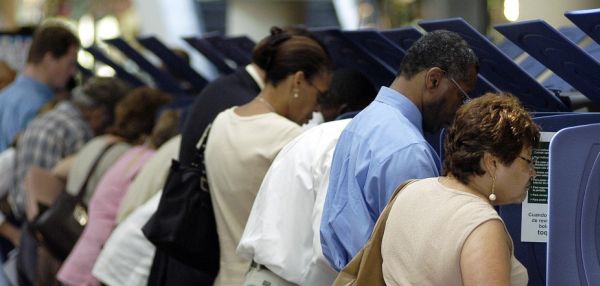San Luis Obispo, CA - As soon as Barack Obama defeated Mitt Romney in the 2012 presidential election, the Republican establishment realized that winning future elections required more minority groups' support and particularly Latino votes.
The GOP primary so far seems to have forgotten that plan as the candidates' harsh rhetoric against immigrants clearly demonstrates. If Mitt Romney had suggested that unauthorized immigrants should self-deport, Donald Trump has upped the ante, calling for the deportation of the 11 million individuals unauthorized immigrants and build a wall to seal the southern border.
The plan is not just seriously deficient from the point of view of humanity; it's also politically suicidal considering the rising power of the Latino vote.
The Pew Research Center tells us that 23 million Latinos were eligible voters in 2012. This figure will increase to 27 million in 2016. It's predicted that 13 million Hispanics will cast ballots in 2016, a 17 percent increase from 2012. The figure could be even higher considering the push to encourage the naturalization of legal Latino residents who are upset at Trump's offensive rhetoric toward Hispanics.
 |
Of the 8.8 million legal residents in the US eligible to become naturalized citizens 2.7 million are Mexicans. Data from the Pew Research Center tells us that Mexicans have been slower to naturalize, discouraged in part by the bureaucracy but also by the required 680 dollar fee. Trump's rhetoric, though, is serving as a spur to do so.
That is bad news for the GOP and its eventual nominee, who at this time appears to be Trump. Although Mexicans tend to be socially conservative, immigration is a very important issue for them. Many remember their own challenges with immigration, may have relatives or friends who struggle with the matter, or are part of a family where some are legal citizens while others are in danger of being deported.
By a significant margin, Latinos tend to register as Democrats. Overall, 60 percent of Latinos are registered Democratic, 20 percent Republican, and the rest independent. Their ideology is split almost even in three parts among conservative, liberal, and moderate.
In so far as active participation in elections Latinos tend to vote at a lower rate than the average overall turnout (48 percent Latinos in 2012 vs. 62 percent overall).
Nevertheless, the Latino vote has been increasing nationally and its influence can be crucial in a number of swing states like Nevada, Colorado, New Mexico, and Florida. These states have been the particular target of naturalization drives which of course will help Democratic candidates.
Ironically, Trump has been a motivating factor in getting more people to become citizens. The New York mogul, though, believes that he will do very well with Hispanics. Exit polls in the recent Nevada caucus would confirm his view since he received 46 percent of the Latino vote. Yet, the sample used there included only the very small number of Latino Republicans who participated in the caucus, making the result close to meaningless. In addition, 7 in 10 Latinos view him unfavorably, according to a survey by The Washington Post and Univision.
In a general election, which would include all eligible Latino voters, Trump is not likely to obtain many Hispanic votes and could lose the presidency. In a hypothetical match up with Hillary Clinton, he'd lose the Latino vote (16% Trump, 73% Clinton), according to a poll. Those figures are consistent with historical results where Latinos tend to vote for Democratic candidates.
Yet Trump, in spite of his ugly comments about Mexicans, believes he'll do very well with Hispanics. That might eventually depend on voter turn out. So far, Trump's support has come primarily from angry white voters who are disappointed with the Republican Party establishment. Latino voters are also angry and may show up en masse not because of enthusiasm for Hillary Clinton, the presumptive Democratic nominee, but rather to vote against Trump.
Domenico Maceri, PhD, UC Santa Barbara, is a free lance writer living in San Luis Obispo, CA. He is the author of a book on Pirandello, one on Spanish grammar, and another on Italian grammar. He has also published a number of articles in newspapers and magazines around the world, some of which have won awards from the National Association of Hispanic Publications.Click HERE for more articles by Domenico Maceri.



